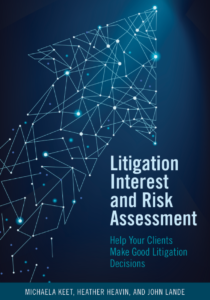Many mediators are finding themselves with a little extra time on their hands during the pandemic. As others on this blog have noted there is a positive aspect to this as we are able to think more often and more deeply about what it is we do, and how we do it and, most importantly, how we might do it better.
Two recently published mediation books together with a new online mediation resource from the ADR Institute of Canada have helped me think about those issues and I thought it worthwhile to share them here.

First, Jennifer L. Schulz’s Mediation and Popular Culture presents a very deep dive into both the mediation process and its depiction in film and television. Professor Schulz comes from the dual perspectives of academic and practitioner and those perspectives combine to serve up a very thought-provoking read indeed. Acknowledging that, “If movies and TV shows about mediation were actually accurate – demonstrating polite, non-adversarial conflict resolution – viewers would be bored, so all popular culture visual media storylines must be “juiced up” with drama and conflict” Professor Schulz moves beyond that to explore ideas and questions suggested by those depictions.
She drills down into five American televisions shows, Fairly Legal, The Good Wife, The Office, Orange is the New Black and Star Trek: The Next Generation and six films, Amélie, Face to Face, Wedding Crashers, The Break-Up, Bajrangi Bhaijaan and The Story of Qiu Ju. (By the way, the full version of Face to Face is available here on YouTube and very much worth the watch.). Her stated purpose is set out in Chapter 1. “Using popular culture to think about mediation will open up space to consider tensions in our field and discuss them in an accessible way, learning things about ourselves along the way.” Her goal is more than achieved in the balance of the book.
Professor Schulz explores concepts of “impartiality”, “self-determination” and “fair outcomes” as they present in popular culture and highlights the gap between what the public might expect from mediators based on these depictions and what mediators actually deliver (not to mention what academics say they should deliver). She moves on to examine the even more ticklish topics of mediator conflict of interest and repeat business followed by deception and caucusing.
For me, one truly astonishing aspect of this book is the depth of mediation research laid bare with each extensively footnoted chapter. This alone would make the book essential for anyone teaching mediation but the author’s highlighting of how many of the historically accepted bedrock principles of mediation are deeply challenged by popular culture makes the analysis both accessible and compelling.
Professor Schulz concludes her study with a call for more depictions of mediation and mediators in popular culture both to increase the public’s familiarity and to assist with mediator identity-building. I put this book down committed to rewatching (or in some cases, watching for the first time) these shows but through a new lens.

Next, let me introduce you to Litigation Interests and Risk Assessment – Helping Your Clients Make Good Litigation Decisions by Michaela Keet, Heather Heaven, and John Lande. I’ve practiced as a commercial mediator for 30 years and in virtually every mediation I’ve conducted at some point, I tell parties and lawyers that mediation provides the opportunity for everyone involved to make a good decision, all things considered. With this new book, Professors Keet, Heavin, and Lande have provided a comprehensive road map to making those good decisions. These three law school professors provide not only an academic perspective (as one would expect) but also a very practical resource that draws on the experiences they’ve each had at the mediation table.
Litigation Interests and Risk Assessment (or, simply LIRA) provides clear, concise, and well-organized content plus appendixes rich with practical tools that can be used every day.
For me, it was the range of decision-making tools that made LIRA stand out. From a simple framework for assessing interests and risks in litigation through checklists, model-based analytics, and data mining the authors have provided a rich smorgasbord for those interested in making good and wise decisions in the litigation context.
Another important element that distinguishes the authors’ approach is to include a weighing of the intangible costs in litigation and a fulsome discussion of “litigation stress”. These very real costs are often overlooked in a more simplistic “probability of winning” monetary analysis.
I know that for me LIRA is a resource I will be going back to often.

Finally, as COVID-19 requires we mediators to continue to mediate online and potential users – lawyers and their clients – struggle to decide whether to mediate their disputes online now or wait for the pandemic to pass, ADR Institute of Canada in collaboration with the ADR Institute of Ontario and Family Dispute Resolution Institute of Ontario has posted a very helpful resource, Online Video Mediation – 3 Key Questions to Determine Whether You Should Use It Now. The questions deal with (1) Security and Confidentiality, (2) Effectiveness of Online Mediation, and (3) Servicing Clients’ Needs. The post comes with Appendices addressing Choosing an Online Videoconferencing Platform, Key Provisions for Mediation Agreements, and Model Participant Preparation Letters for Online Mediation. Those responsible for putting this together and posting it so quickly should be rightfully proud of a resource that will be useful far beyond the Ontario and Canadian audience for whom it was intended.
________________________
To make sure you do not miss out on regular updates from the Kluwer Mediation Blog, please subscribe here.



The resources you point us to are always so helpful – thank you Rick.